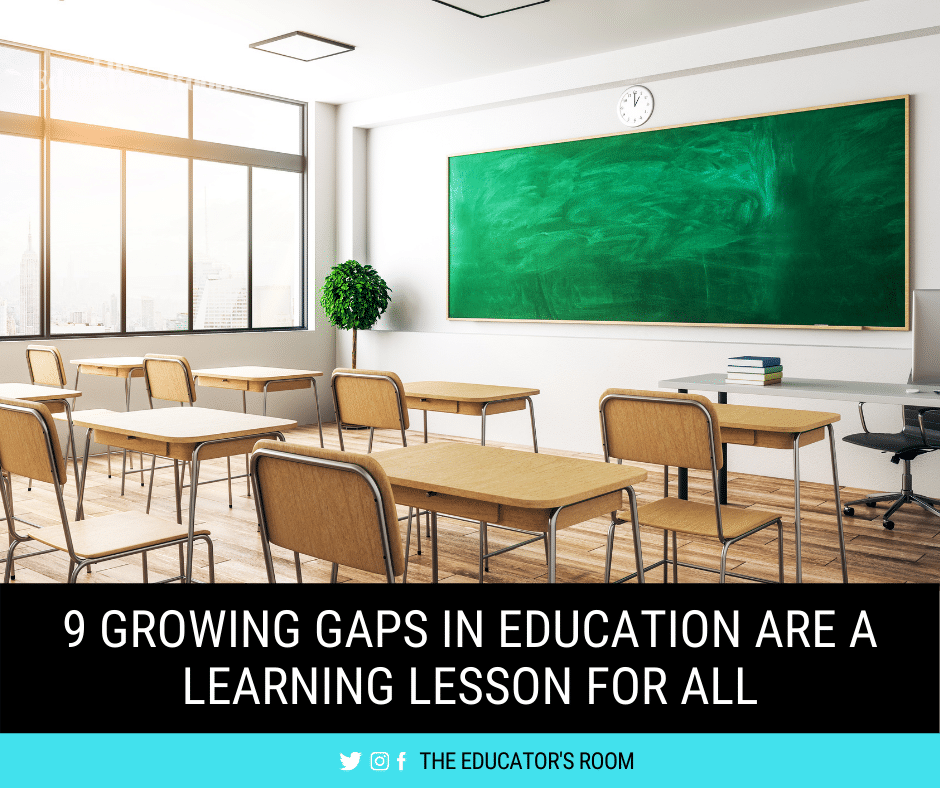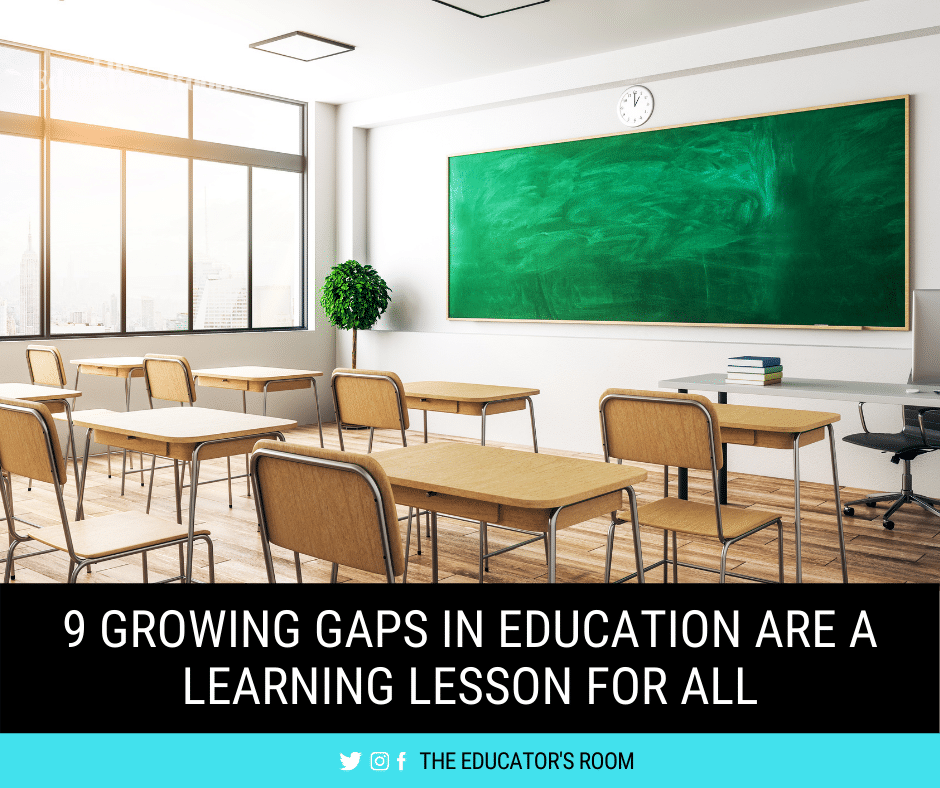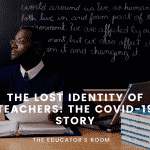I read the news regularly and work diligently at having a solid give-and-take, reciprocal relationship with my students, but these 9 growing gaps in education have been quite a learning lesson for me. Our atypical 2020 school year (with hybrid/online learning and mask-wearing) has most certainly highlighted in ways I cannot ignore.
1. THE HAVE AND HAVE-NOT STUDENTS
When we returned to class this fall, I noticed students had a very binary reaction to schooling since March, when my state closed schools, and participating in classwork at my district was practically optional. The students who had support and resources at home treated the time much like Google employees do their Fridays – a time for experimentation around something they’re passionate about. Kids taught themselves guitar, coding, worked on Eagle Scout projects, or read a ton of books.
On the other hand, other students dove deeply into consuming rather than producing, with their phones and their Netflix their only outlets. These same kids are the ones who are struggling immensely now that school has returned. As the former group quickly knocked off the rust and returned to a school mindset, this group has not. And if they’re learning completely or partially online, that problem has been compounded by distance.
2. THE HAVE AND HAVE-NOT DISTRICTS
It should be no surprise that some public school districts face a tougher battle in terms of having many struggling students while also not being fully funded to properly educate them. These districts are currently reeling. This is largely because they allocated resources these last 6 months addressing the basic needs of their students (remember, folks, we “got to Maslow before we Bloom“). This has left for some major deficits in school budgets for other needed resources, like laptops and additional teachers and staff.
3. THE ECONOMIC MARGINS OF A DISTRICT BUDGET
But let’s face it, it doesn’t matter what financial situation any district was before the COVID outbreak — every one of them are struggling to plug the gaps in the sieve of their funding system because they’re already operating on shoe-string budgets. That’s largely because that’s how states fund schools, but it’s also because the most common stereotype of a school board member is a tongue-in-cheek Twain caricature of a retired white man who’s just always pissed off about his school taxes. So there are NO margins in a school budget to do something like ensure every kid has a laptop. Or to give a teacher a second computer monitor for $75 to ensure more productivity at home as they conduct their jobs from their kitchen tables.
4. HOW TO BEHAVE & TEACH ONLINE
For some reason, we had this assumption that students knew how to behave online. But how to speak in front of a camera and send your superior a message (in this case, the teacher) is a skill that must be taught and yet — hasn’t. Additionally, teachers and administrators have to be prepared with dealing with and punishing online misbehavior (just ask any online teacher and they have a story — honestly!) or to deal with something as simple as cheating is outside our wheelhouse.
5. INTERNET FOR ALL
FAPE (Free and Appropriate Public Education for all) is guaranteed to all students via the IDEA Act of 1973. In the past, that meant everyone had a seat at the table in decisions or at a little desk in the classroom. Now that classrooms have pivoted to being completely online, nearly 1 in 4 rural students do NOT have access to high-speed Internet. That’s an astounding impediment to learning and focuses a true need to treat the Internet like the information superhighway it is, and something that should be just as easily accessible as an on-ramp to the nearest Interstate road.
6. KEYBOARDING SKILLS
There’s been this common lament online about how schools have stopped teaching cursive writing. As someone who enjoys reading the Declaration of Independence and the Constitution of the United States of America, I think cursive handwriting is beautiful. But I think the same about horseback riding as well. I also find them to be completely impractical to the future of education and transportation, respectively. What is crucial is for students to be able to type at 3o words per minute or better. Most student’s dexterity doesn’t move further than typing on a phone, and it shows. In classes where notes are now expected to be taken online, it’s become increasingly evident that the keyboarding skills drilled into students in the mid-90s through the early 2000s are completely erased from the curriculum and necessitate a return to schools.
7. SUPPORT FOR NEW STUDENTS
As a kid who moved around quite a bit, I am really trying to empathize with my new students. Being the new kid is hard enough, but being the new kid wearing a mask, socially distancing, or only seeing your new neighbors on Zoom is increasingly harder. We’re trying to figure out ways to support our new students but are often left with devoid of any plan in helping them bridge the gap and find common interests with their new peers.
8. CHILD CARE
Access to great child care is something that was difficult enough to find already (we spend about 80% of my salary on my 2- and 4-year-olds’ tuition, which is more than what my wife and I paid for college). But in ensuring kids are in a good, safe, education-friendly environment to learn is not just vital for their own education, it’s vital for parents’ involvement in the nation’s greater market and their own personal incomes. Parents who have been able to pivot to work from home or quit their jobs to focus on their kids are at a much greater advantage than those we deem “essential workers.”
9. SUBSTITUTES
I’ve said it once, and I’ll say it again: substitute jobs are not the Field of Dreams. “If you build it, they will come” is not a strategy to ensure our teachers can take a day off to care for sick ones or for a much needed mental break. The lack of substitute teachers is the fruit of teacher detractors’ labor, for they’ve castigated our profession for so long that we can no longer rely upon new college entrants to plug the gaps (they’re just not there). The retirees we have relied upon would think it crazy to risk their well-being for $90 a day.
I’m going to say it loud for folks in the back: 📢WE📢COULDN’T📢 GET📢 SUBS📢 BEFORE📢, SO📢 WHY📢 WOULD📢 THEY📢 ENTER📢 A📢 SCHOOL📢 THIS📢 FALL📢 FOR📢 $90📢/ DAY?📢
— Mr. Jake Miller (@MrJakeMiller) July 14, 2020







